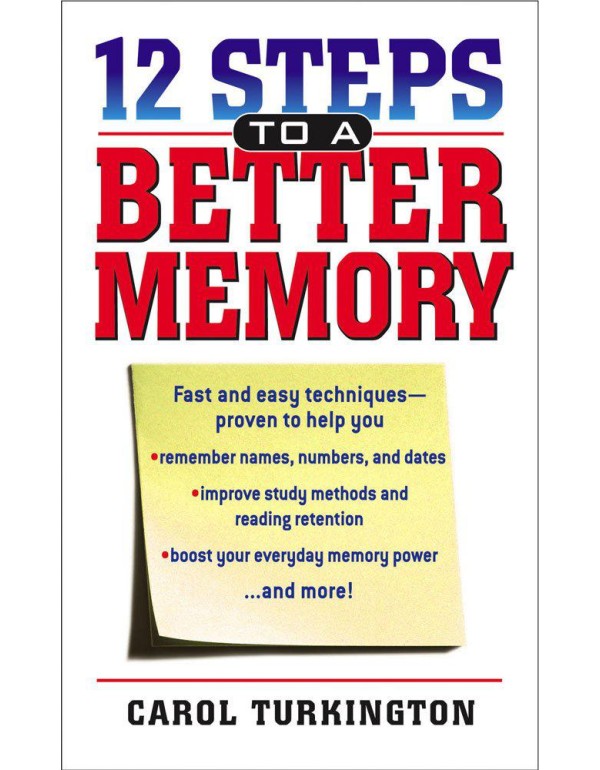Tags: 9780743475754, Pocket, Turkington, Carol, Paperback
12 Steps to a Better Memory
Price: $9.19
Shipping & Tax will be calculated at Checkout.
Estimated delivery time 7-14 days.
International delivery time 2 to 4 weeks.
Estimated delivery time 7-14 days.
International delivery time 2 to 4 weeks.
Product DescriptionAn improved memory can benefit anyone -- but for students today, it is critical to develop the memory power that puts you ahead on test scores. Here is the only' reference you'll need to sharpen your memory skills and excel in academics, career, social life, and even the joy and convenience of daily tasks.This accessible and informative guide explains the proven method of Loci, the Link Method, the Peg System, mnemonic techniques, visual aids and other strategies that can help you to:retain factual information improve study skills master foreign languages recall names, numbers, dates, faces, locations, appointments, and more.Also included is insightful information on the effects of aging on memory, preventing or reversing memory loss, and how factors including stress, caffeine, sleep, and diet affect memory.Excerpt. © Reprinted by permission. All rights reserved.STEP 1:Understand How Memory WorksWhether it's the date of your spouse's birthday or where you left the keys to your car, nothing is more frustrating than not being able to remember something. Forgetting may also have more serious consequences, as when you can't remember information for a test or forget an important business appointment.Before getting into a discussion of how to improve your memory by learning new behaviors and memory strategies, it's a good idea to have an idea of how we form and recall memories in the first place.Memory is really not so much a retrieval as it is an active construction. If you say that you know something, you're really speaking metaphorically -- you're assuming that you can construct the answer. Contrary to beliefs in past centuries, memories do not exist as fully formed bits of flotsam in your brain.Where Is Memory At present, the seat of memory cannot be found in any one place in the brain. Instead, scientists believe memory actually functions on a much more basic level -- the level of synapses scattered in weblike patterns throughout the brain. In fact, scientists don't really make any distinction between how you remember and how you think. No one completely understands either process. The quest to discover how the brain organizes memories and where those memories are acquired and stored is a continuing challenge for brain researchers.In order to study memory, traditional researchers have used drugs or surgery on animals to affect parts of the brain, and then applied behavioral tests to measure those effects. These experiments have shown that memory is a biological phenomenon with its roots firmly in the senses -- sight, sound, smell, touch, kinesthetic, and so on.How Memories BeginThe latest research suggests that memories begin with perception. If your earliest memory is of nestling in the arms of your mother, your visual system identified the attributes of objects in space: "This shape is Mother's face, this shape is a sweater, this is its color, this is its smell, this is how it feels."Each of these separate sensations then travels to the part of the brain that integrates the perceptions as they occur into a single, memorable moment, binding them into the experience of being held by Mother. The brain then consolidates information for storage as permanent memory. Thus, memory and perception are intertwined in a subtle and unbreakable bond that unites all of our experiences.However, it is possible to speak of visual memory and verbal memory as two separate things. About 60 percent of Americans have a visual memory, easily visualizing places, faces, or the pages of a newspaper. The rest seem better able to remember sounds or words, and the associations they think of are often rhymes or puns.How Memories Are RecordedUnderstanding the link between memory and perception provides only part of the picture. While memory does indeed begin with perception, many researchers believe that memories are recorded by electricity. Nerve cells connect with other brain cells at junctions called synapses;
Author: Turkington, Carol
Publisher: Pocket
Binding: Paperback
Language: English
ISBN-10: 0743475755
ISBN-13: 9780743475754
Author: Turkington, Carol
Publisher: Pocket
Binding: Paperback
Language: English
ISBN-10: 0743475755
ISBN-13: 9780743475754

